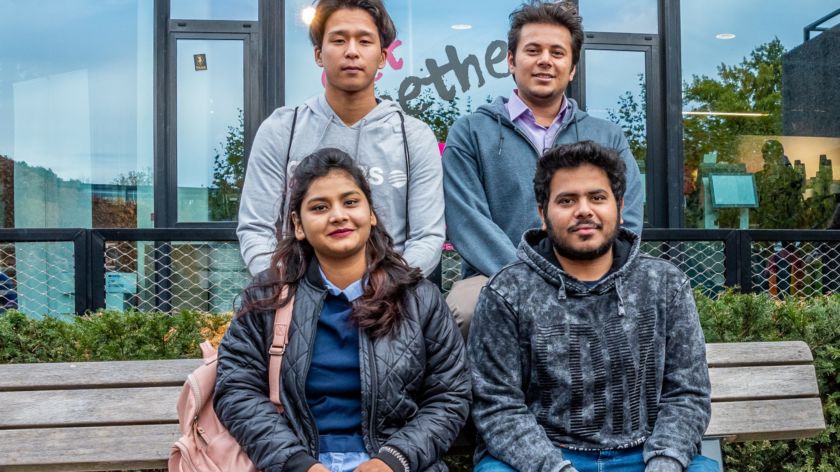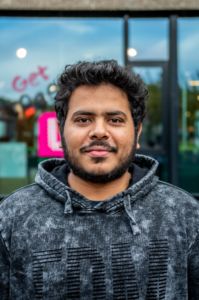Chicken noodles instead of Pav Bhaji: Asian students in Nijmegen
-
 Asian students Masafumi; Jwalant, Shanto and Mohit. Photo: Juliette Breuseker.
Asian students Masafumi; Jwalant, Shanto and Mohit. Photo: Juliette Breuseker.
Moving to a different country could be pleasant or petrifying, imagine that for a different continent. For Asian students, differences between food, festivals and culture in most Asian and European countries are enormous. Jwalant Yagnik, an Asian student himself, asked a series of questions to students from India, Bangladesh and Japan.

Mohit Jethwani, a student from India, who just started his master’s in Artificial Intelligence this September says: ‘I have never had a moment of any sort of social awkwardness yet.’ He feels quite accepted by the Dutch people. A similar opinion is shared by Japanese student Masafumi Sunakoda, who is studying Cultural Anthropology here since eight months.
On the other hand, Shanto Rahman, a master student specialising in Globalisation, Migration and Development, did experienced a difference between Dutch students and internationals. During classes, the two groups of students are divided into separate groups, which obviously creates a distance.
Shop clerks
Additionally, speaking about acceptance, a barrier that might exist is the language. Talking about it, Mohit and Shanto shared that there is a problem when it comes to everyday activities like going to the supermarket. In the case of Mohit, being a vegetarian, it is difficult to make out what ingredients there are in the food. ‘I bought a pack of noodles thinking it was vegetarian, but I later discovered that it has traces of ‘kip’ (chicken) in it, and was useless for me’, said Mohit, recounting one of his early experiences.
‘I bought a pack of noodles thinking it was vegetarian’

In addition to this, being in a group of Dutch students, who keep speaking in Dutch, makes one feel left out, says Shanto, remembering one of her field tours with her classmates. ‘They just kept talking and chatting away in Dutch, while I was sitting alone thinking if I should ask them to revert to English, so that I wouldn’t feel left out’, said Shanto. She misses the people and the warmth she felt with them back in Bangladesh. Shanto feels that the people here are more closed and reserved in comparison.
Nevertheless, Masafumi does not feel that language is a problem in his day-to-day life. ‘I always find the shop clerks very helpful when I go to supermarkets’, says Masafumi. He addds, ‘I could always ask them about the products I wish to buy, they are quite fluent in English and are almost always able to help me figure out the details I wish to know.’
Another major difference that is felt is in the level of education. All three students agree on the point that the educational standards here in the Netherlands are vastly higher than back home, but they also feel that this study platform is much better in terms of research opportunities. The teaching methods here are quite different and take some getting used to, according to Mohit.
Pizza
When in a foreign country, people will definitely miss things from back home. While discussing things that they miss from back home, Mohit and Masafumi concur that it is the food that they miss the most. It is hard to find authentic Indian or Japanese cuisines here. ‘Spices are one thing that the Dutch have not figured out yet! The food here is so bland’, says Mohit, adding ‘I really miss the mouth-watering spicy food from India, especially the ‘Bombay style Pav Bhaji’, a red hot mix of vegetables made with a ton of spices and eaten with a special bread, or common street foods such as ‘pani puri’ or ‘bhel puri’ which are typically wet, yet amazingly crunchy and so tangy!’
‘I really miss the mouth-watering spicy food from India’
Masafumi thinks about his favorite dishes from back home and says longingly, ’the Hiroshima style Okonomiyaki! That is my soul food! It is like pizza, but in Hiroshima, we add noodles to it. Simple as it may sound, I can’t find the proper type of noodles here, also, the sauce is not something I could make and it is impossible to find here.’
Housing situation

Finally, on being asked about the biggest shock they felt after coming here, they had different stories to share. Masafumi said that it was just the level of study here that caught him off-guard, because the studies in Japan are so easy in comparison to this.
Mohit, who had worked for 3 years in India, before starting a master’s degree here, saw the life-style of the Dutch people and was very impressed by their work-family-personal life balance. He said that now he values family time much more than back in India.
Shanto was just flabbergasted by the housing situation in the Netherlands. She initially had a lot of difficulties in finding a home, and the feeble chances to find any scholarship or work in a Dutch environment, made her first months here increasingly difficult. But, over the year, things did get easier. She now has a home, a scholarship as well as a job!




Anjali Rameja schreef op 19 november 2018 om 16:24
Helpful…!